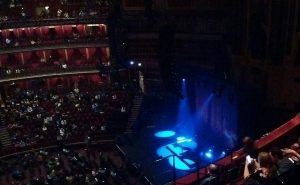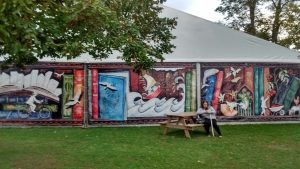Bit of String: The Relevance of Little Earthquakes
As a late sixteenth birthday present, I took my son to Tori Amos’ concert in the Royal Albert Hall Wednesday night. He appeared to be the youngest in the huge audience, but he loves Tori’s music, often fully recreating it on the piano by ear, and he recognised every song she played by its opening chord, turning to me to whisper excitedly.
On our way to the concert, he said, ‘I don’t think I’ve asked you this before. I mean, I know you have her music and that’s how I got to know it, but is she one of your favourites, too?’
The answer, of course, is yes. I told him about the Columbia and BMG cassette tape deals of the mid-90s, how you could join their ‘clubs’ and get tapes at cut prices. I used these, as an adolescent, to buy all kinds of music to experiment with what I best related to. I bought Under the Pink as part of my explorations, with Little Earthquakes quick to follow.
She came out with lyrics we didn’t usually hear from singers. Before Alanis Morissette asked ‘Are you thinking of me when you fuck her?’ and Fiona Apple owned being a ‘Criminal’ and a ‘Sullen Girl,’ before Paula Cole got sarcastic about cowboys, there was Tori admitting she wanted to ‘smash the faces of those beautiful boys’ who took advantage of her as a child in ‘Precious Things.’ She reminded us, ‘You’re just an empty cage, Girl, if you kill the bird,’ and she knew we’d been ‘Silent All These Years.’ So I was thrilled to see her live, to enter the Royal Albert Hall, although it was an even bigger thrill to attend with my son and see his joy as he said, ‘I feel so light, I feel like I weigh nothing.’

‘It’s the crowd’s reaction when she started playing “Silent All These Years,”’ he said as we wandered through London the next day, making a required stop at the American Embassy and then moving on to the sculpture exhibition in Regents Park and the London Zoo. ‘That’s what makes me so happy, that she’s still really relevant today, and she could see it for herself there.’
I’m intrigued that he takes that away from the event; as a musician he’s pondering relevance and as a teenager he’s already giving some consideration to generativity versus stagnation, Erikson’s late stage of psychological development.
But it also made me think about what makes music—or literature—relevant. In Tori’s case, I think there’s that revelatory quality, of communicating something true (at least for a lot of us) that hasn’t yet been voiced enough.
And as I’ve written before, it’s about creating beauty from pain.
Relevance at Cheltenham Literature Festival
Fast forward to Saturday. Cheltenham Literature Festival day! I love this festival, there’s so much on and the vibe is excellent. My husband came out for the evening with me and we saw comedian Robert Webb (of Mitchell and Webb, as in Sir Digby Chicken-Caesar) speak about his new book, How Not to Be a Boy. He spoke, wryly but warmly, about the difficulties of conforming to gender stereotypes.
Given that my son has such varied interests, you may see why the topic is relevant to me. Here, Mr. Webb has created a piece of work from his own sometimes painful childhood of feeling misfitted. He also put a particularly public voice to what may well be a private dilemma for a lot of people.

Before that, I had been in the Sky Garden Tent with a few hundred others to see Sarah Waters receive the Times Award for Literary Excellence. Having read Fingersmith last year and considering it the most surprising twist I have ever read—and the most well-executed, she was the top of my must-see list for this year’s festival.
Sarah Waters managed to bring lesbian historical fiction into mainstream literature. I suspect that’s hugely relevant to a lot of people. For those of us not that way inclined, it’s still important to read that perspective. I also loved her answer when asked about planning one of her later novels. She said she’d just been through the hard break-up of a longterm relationship.
‘I thought, this has been really awful. So I might as well make some fucking money out of it!’
Fellow writers, I think we’ve all been there. Not making money out of it necessarily, but at least putting our tough times into artistic form, creating characters to carry those burdens for us.
Before the prize-giving, I’d watched a panel discussion on Being Other in Britain Today. Nikesh Shukla talked to June Sarpong and Reni Eddo-Lodge about their books. Check out Mr. Shukla’s campaign to start a quarterly journal of great writing from authors of colour, and the website for June Sarpong’s new book Diversify, which lists practical steps to tackle all our private prejudices.
It was a challenging decision which book to buy after this event. (I can’t buy every single one; I’d go broke.) I chose Ms. Eddo-Lodge’s Why I’m No Longer Talking to White People About Race. It seemed the one I might need the most education on. When someone from another sphere of experience feels they’re not being heard, the logical step is undoubtedly for us to listen.
Ms. Eddo-Lodge’s book is based on a blog post she wrote a few years ago. She says she never imagined the piece would go viral; it was something she had to get out of her system. Once she had written her feelings of frustration at how her white friends seemed to ignore her concerns about race, she felt that was that, and didn’t assume dialogue would actually ensue.
Which goes to show, perhaps, that our writing can be relevant and impactful to us even when we don’t do it for a large audience. We can’t really predict how many others might need to read it, can we?